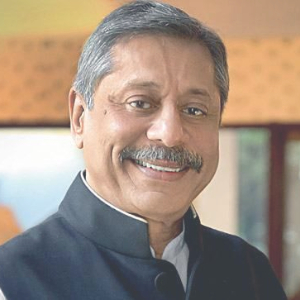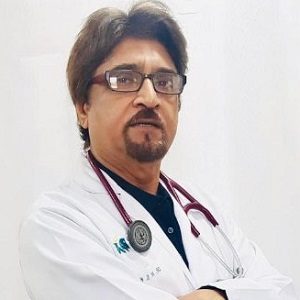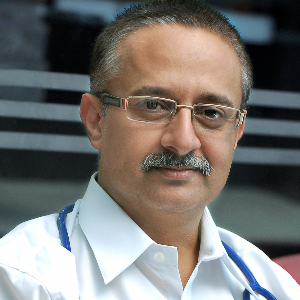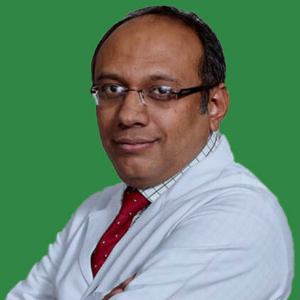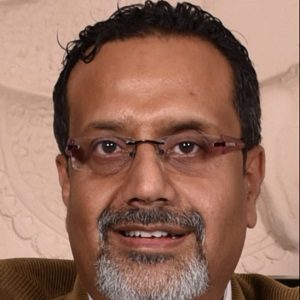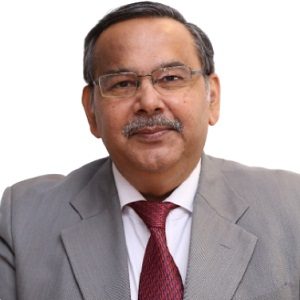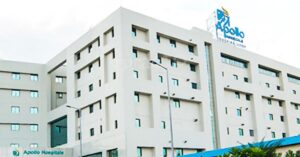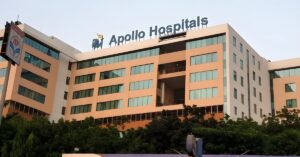Best Doctors in India for AVM Brain Treatment
- Cardiac Surgeon, Gurugram, India
- Over 40 years’ experience
- Medanta-The Medicity, Gurgaon
Profile Highlights:
- Dr. Naresh Trehan is one of the most highly skilled and globally recognized cardiothoracic and vascular surgeons.
- His experience encompasses 40+ years and is considered one of the most successful and accomplished cardiac surgeons in the country.
- Dr. Naresh Trehan specializes in cardiovascular surgery, cardiothoracic surgery, Heart Transplant, and Minimally Invasive Cardiac Surgery and has performed more than 48,000 successful open-heart surgeries to date.
- He started his career as a Cardiac Surgeon at New York University Medical Centre where he performed over 3000 coronary artery surgeries and returned to India in 1988 and founded the Escorts Heart Institute and Research Center in New Delhi.
- Dr. Trehan is the Founder Chairman of Medanta- The Medicity in Gurugram, a premier multi-specialty hospital with state-of-the-art infrastructure and equipped with the latest and advanced technologies.
- Top Pulmonologist and Respiratory Medicine specialist | Apollo Hospital, New Delhi, India
- 48+ Years Experience
- Indraprastha Apollo Hospital, New Delhi
Profile Highlights:
- Dr. M.S. Kanwar is a distinguished pulmonologist with an impressive 46-year career, renowned both in India and internationally for his expertise in COVID-19, sleep medicine, and pulmonary care.
- Dr. Kanwar’s pioneering spirit extends to sleep medicine, where he made history in 1995 by establishing the largest and most advanced sleep lab in India at Indraprastha Apollo Hospital in New Delhi. His work in this area has set a high standard for sleep disorder management in the country.
- His other areas of expertise include asthma, COPD, lung infections, COVID-19, lung fibrosis, ILD, tuberculosis, lung cancer, sarcoidosis, lung transplants, ICU-related diseases, sepsis, and mechanical ventilation. He is skilled in advanced procedures such as bronchoscopy, EBUS (Endobronchial Ultrasound), and medical thoracoscopy.
- Pediatric Cardiac Surgeon, New Delhi, India
- Over 30 years’ experience
- Marengo Asia Hospital, Faridabad
Profile Highlights:
- Dr. Rajesh Sharma is one of the most experienced and widely acclaimed Cardiothoracic and Vascular surgeons specializing in pediatric cardiac surgery in India.
- He provides treatment for both adult and pediatric heart diseases and disorders and focuses primarily on complex congenital heart diseases.
- Dr. Sharma’s expertise lies in infant and Neonatal cardiac surgery, surgery for transposition of the great arteries, Fontan circulation, and acquired heart diseases.
- His experiences encompass over 3 decades during which he has performed over 20,000 heart surgeries including congenital heart disorders as well as acquired heart defects.
- Hematologist & BMT Specialist, Gurugram, India
- Over 20 years’ experience
- Fortis Memorial Research Institute
Profile Highlights:
- Dr. Rahul Bhargava is a leading Hematologist and BMT specialist currently working at Fortis Memorial Research Institute, Gurugram.
- Dr. Bhargava has an experience of more than 20 years in Hematology, Pediatric Hemato Oncology, and BMT during which he has performed numerous BMTs with successful outcomes.
- He primarily specializes in Haploidentical and unrelated match transplants and has performed over 1500 transplants till date.
- In 2016, he became the first Indian doctor to perform and popularize BMT for Multiple Sclerosis.
- Top Rheumatologist | Apollo Hospital, New Delhi, India
- 30+ Years Experience
- Indraprastha Apollo Hospital, New Delhi
Profile Highlights:
- Dr. Sundeep Kumar Upadhyaya is one of the best Rheumatologists in India, working at Indraprastha Apollo Hospitals, New Delhi.
- He has over 30 years of experience in modern medicine, spondylitis, rheumatology, arthritis, and other connective tissue disorder treatment.
- Dr. Upadhyaya has also been a crucial part of various research.
- He was one of the first rheumatology experts in India to introduce bioagents to treat rheumatoid arthritis, inflammatory spondylitis, and ankylosing spondylitis.
- Dr. Upadhaya provides training for PG students in Apollo Hospital, New Delhi.
- Top Rheumatologist | Apollo Hospital, New Delhi, India
- 35+ Years Experience
- Indraprastha Apollo Hospital, New Delhi
Profile Highlights:
- With over 40 years of distinguished experience in Rheumatology, Dr. Prof. Rohini Handa is a leading Rheumatologist based at Indraprastha Apollo Hospitals, New Delhi. A celebrated figure in his field, he has a robust background that combines deep clinical expertise with significant academic and leadership roles.
- Dr. Rohini Handa is renowned for his expertise in managing a range of rheumatologic conditions, including Rheumatoid Arthritis, Myositis (muscle inflammation), Sjogren’s Syndrome (a condition leading to dry eyes and mouth), and Multiminicore Disease (a muscle disorder).
- He excels in performing key diagnostic and therapeutic procedures such as analyzing synovial fluid (the fluid within joints), conducting joint injections and aspirations (to remove excess fluid from joints), and administering cortisone injections (steroid treatments to alleviate inflammation).
Best Hospitals in India for AVM Brain Treatment
- City: New Delhi, India
Hospital Highlights:
- Equipped with 650 beds, BLK-Max Super Speciality Hospital is the largest stand-alone private sector hospital in Delhi.
- With over 1500 healthcare providers and 150 globally renowned super specialists, the hospital is one of Asia’s largest BMT Centres. The hospital is known for having some of the best cancer doctors in the country.
- The hospital is NABH and NABL accredited and was inaugurated by the first Prime Minister of India. Pt. Jawahar Lal Nehru.
- City: Hyderabad, India
Hospital Highlights:
- Located in the vibrant city of Hyderabad, Apollo Health City is a world-renowned medical facility that provides outstanding care and treatment to patients coming from different parts of the world.
- Founded in 1988, this 550-bed multispecialty hospital with 50 specialties and 12 Centres of Excellence continues to deliver outstanding outcomes for patients with the simplest to the most complicated medical conditions.
- Backed by the latest medical equipment and a dedicated team of professionals, the hospital provides comprehensive treatment across various specialties including, cardiology, critical care, neurosciences, cancer, orthopedics, gynecology, ENT, transplants, gastroenterology, etc.
- Apollo Health City is a cutting-edge healthcare facility that combines various facilities under one roof. These may include state-of-the-art physical medicine, rehabilitation, and wellness services with education, research, telemedicine, innovative medical devices, disease management programmes, and medical talents.
- The hospital is known for offering top-notch cancer treatment accompanied by cutting-edge facilities and technology.
- The hospital also offers a broad spectrum of cosmetic procedures that improve not just appearance but also comfort.
- In 2011, Apollo Health City was the recipient of the Asian Hospital Management Award (AHMA).
- In 2013, the Government of India recognized Apollo Health City as the top medical tourism destination in the country.
- City: Mumbai, India
Hospital Highlights:
- Kokilaben Dhirubhai Ambani Hospital, Named after the wife of Indian industrialist Dhirubhai Ambani, the founder of Reliance Industries, this is one of the top hospitals in Mumbai. This 750-bed multi-specialty hospital became operational in 2009. Known as one of India’s most advanced tertiary care facilities, the hospital is designed to raise India’s global standing as a healthcare hub, with an emphasis on excellence in clinical services.
- Kokilaben Dhirubhai Ambani Hospital uses Protocol and Care Pathway based treatment models to ensure the best outcomes for patients.
- The hospital represents a confluence of top-notch talent, cutting-edge technology, state-of-the-art infrastructure, and, most importantly commitment.
- The hospital also holds the accreditation of the NABH, NABL, CAP, and JCI.
- The hospital has been recognized as the No. 1 Multispecialty Hospital in Mumbai and the West Zone for the fifth year in a row in 2020 by The Week.
- City: Chennai, India
Hospital Highlights:
- Apollo Cancer Centre in Teynampet, Chennai is one of the best super speciality hospitals in India. It is the country’s first ISO-certified healthcare facility.
- Additionally, it is the first hospital in Chennai and the first oncology hospital in India to receive NABH accreditation.
- The hospital provides advanced tertiary care in oncology, orthopedics, neurology and neurosurgery, head and neck surgery, and reconstructive and plastic surgery.
- Additionally, it offers specialized healthcare of international standards with results comparable to those of the best hospitals in the world.
- It is outfitted with 300 beds, the newest and greatest technology, a large pool of highly qualified specialists, and a committed team of medical and paramedical professionals.
- It is one of the first few medical facilities in India to offer comprehensive cancer care. A team of skilled medical, surgical, and radiation oncologists makes up the Tumour Board, which is a component of the complete treatment planning system. After reviewing reported cases, the Board determines in concert with diagnostic specialists what course of action is best for each individual patient. The panel is further supported by dieticians, medical counselors, speech therapists, and other pertinent specialists.
- The hospital launched the first ExcelsiusGPS® Spine Robot in South India and has completed over 50 surgeries till date.
- It is also one of the few cancer hospitals in India to offer Cyber Knife therapy. Till now it has completed 1320 Cyber Knife therapies.
- The institution is also one of the few in India with the capacity to do transplants and find a prospective unrelated donor. The hospital has performed over 1000 BMTs till now.
- Furthermore, it has an exceptional milestone of performing exultant Micro vascular free tissue transfer and Aesthetic surgeries on more than 1000 patients with success.
- City: Chennai, India
Hospital Highlights:
- Apollo Hospitals, Chennai, is one of the best hospitals for heart care in India. Over the years, Apollo has expanded all over India, as a healthcare chain.
- India’s first ‘Only Pancreas’ transplant was performed in Apollo Hospital. The hospital is known for successfully performing Asia’s first en-bloc combined heart and liver transplant, and over the years, it has attained a remarkable achievement in the global healthcare space. Around 3-4 organ transplants are performed in the hospital per day.
- Equipped with over 500 beds, this hospital in Chennai was established in 1983 and since then has been among the most preferred hospital for patients from all over the world.
- The hospital holds accreditation of the NABH and JCI and is the first hospital in India to be ISO 9001 and ISO 14001 certified. It is also the first South Indian Hospital to receive subsequent reaccreditation from the JCI USA 4 times.
- City: Chennai, India
Hospital Highlights:
- Established in 1999, Gleneagles Global Hospital, Chennai, is one of the top healthcare facilities in Southern India. It is part of the Gleneagles Hospital Chain, which is the fourth largest healthcare chain in the country. The hospital specializes in multi-organ transplants of kidneys, liver, lungs, heart, etc.
- The hospital has an excellent infrastructure and state-of-the-art lab and equipment set-up. The hospital boasts cutting-edge technologies, a highly skilled team of doctors and surgeons, and trained support staff. Located in Perumbakam, Chennai, it is one of India’s premier health care destinations. The hospital has performed some of the most complex surgical and clinical procedures in India including multi-organ transplantations.
- The hospital’s lung transplantation program is one of the best in the country. The hospital is known for having performed India’s first single lung transplant and first minimal invasive lung transplant. It is also the only Indian hospital to be associated with King’s College Hospital, London, United Kingdom for liver transplantations.
- City: Hyderabad, India
Hospital Highlights:
- KIMS Hospital (a brand name of Krishna Institute of Medical Sciences) is one of the largest and best multi-speciality hospitals in Hyderabad. The hospital provides various treatments to an enormous number of patients.
- The hospital has a capacity of more than 3000 beds. KIMS Hospitals offers different healthcare services in more than 25 specialities and super specialities.
- The hospital is equipped with modern medical equipment and technology. It has robotic equipment to provide minimal invasive techniques for patients.
- The hospital is aimed at providing world-class healthcare facilities and services at an affordable cost for patients.
- The various specialities and departments of the hospital include neurosciences, gastroenterology & hepatology, robotic science, reproductive sciences, dental science, oncological sciences, organ transplantation, heart and lung transplantation and mother and child care.
- City: Kolkata, India
Hospital Highlights:
- Established in 2003, Apollo Gleneagles Hospitals is a 750-bed multispecialty tertiary care hospital situated in Kolkata.
- With 33 Centres of Excellence and more than 50 specialties, Apollo Gleneagles Hospitals, Kolkata is capable of handling all sorts of patients.
- This tertiary care hospital, which is a 100% subsidiary of Apollo Hospitals Enterprise Ltd., India, is regarded as one of Kolkata’s top hospitals.
- The facility is a complete blend of cutting-edge technology, state-of-the-art infrastructure, and genuine hospitality.
- Focusing on numerous specialties, the hospital provides all-inclusive medical treatments supported by cutting-edge technology and a staff of highly qualified medical specialists.
- Patients across the globe come to Apollo Gleneagles Hospitals Kolkata for their treatment. Moreover, international patients receive full attention and assistance for their treatment and are provided with a hassle free experience.
- Apollo Gleneagles Hospitals, Kolkata is the only hospital in Eastern India to hold the Joint Commission International (JCI) certificate.
- It is also the only hospital in Kolkata to hold the NABL accreditation in six different categories, which includes Clinical Biochemistry, Clinical Pathology, Hematology & Immunohematology, Microbiology & Serology, and Histopathology & Cytopathology.
- Furthermore, Apollo Gleneagles Hospitals, Kolkata is known for performing the first ever Reverse Shoulder Prosthesis Replacement in East India.
- City: Bengaluru, India
Hospital Highlights:
- Established in 1991, Manipal Hospital, Old Airport Road, Bangalore is the flagship facility of the Manipal Hospitals Group, which is one of the largest networks of Multispecialty Private Hospitals in India.
- The facility is well-known for its state-of-the-art technology, performance-driven, patient-centric, and evidence-based approach.
- The facilities offered at Manipal Hospital meet the highest international standards, allowing the hospital to attract a large number of national and international patients.
- Their expertise encompasses the diagnosis and treatment of a wide range of diseases in several specializations that address both simple as well as complex medical procedures.
- There are total 600 beds accessible in the hospital for the in-patients so they may heal while being closely watched after by the medical team. In addition, it has 144 critical care units, including NICUs, ICCUs, and ICUs. Apart from that, the hospital also offers 20 contemporary, modular state-of-the-art operating rooms with all the amenities needed.
- The hospital has several departments that are overseen by highly skilled, certified, and experienced medical experts.
- One of the best departments in the hospital is that of the Cancer department which is known for its advanced cancer diagnosis and treatment facilities such as Intracavitary Chemotherapy, Biological Therapy, HIPEC, PIPEC, Nuclear Medicine, Radiation Therapy, etc.
- It is one of the few hospitals in Bangalore that provides full range of pediatric services, including pediatric emergency services, pediatric gastroenterology, pediatric neurology, pediatric cardiology, pediatric orthopaedics, pediatric allergies, pediatric immunology, and infectious diseases.
- Furthermore, Manipal Hospital, Old Airport Road, Bangalore is also regarded as one of the best hospitals for bone and spine related disorders.
- City: Mumbai, India
Hospital Highlights:
- Established in 2016, Apollo Hospitals, Navi Mumbai is one of Maharashtra’s most advanced multispecialty hospital. This 500-bed hospital provides sophisticated treatments and integrated super specialty services under one roof.
- The hospital features a cutting-edge infrastructure that houses 13 state-of-the-art operating rooms, advanced laboratory and medical diagnostics, and 120 ultra-modern I.C.U. beds, including N.I.C.U. and P.I.C.U., monitored round the clock by critical care specialists.
- With 57 specialties and subspecialties, the hospital boasts a team of renowned medical specialists who offer accurate diagnosis and treatment with easy accessibility to their patients.
- Additionally, the hospital offers highly customized, individualized health check programs that are made to fit each person’s needs in terms of lifestyle.
- Apollo Hospitals, Navi Mumbai has been accredited by both the National Accreditation Board for Hospitals and Healthcare Providers (NABH) and the Joint Commission International (JCI).
- Apollo Hospitals Navi Mumbai has been awarded the “Best Practices-International Services Award” at the annual awards for service excellence and operations excellence.
WHAT IS AN AVM BRAIN?
What causes Brain AVM?
The primary cause of AVM is still unclear. Some people have brain AVM by birth while some others develop the same later. A notable point is the passing down of this malformation amongst families, genetically.
Occurrence rate of AVMs
Brain AVMs occur very rarely and their occurrence rate is around 1% of the population. However, you might observe male predilection for AVM of the brain.
Where AVMs occur
Although an AVM may develop anywhere within the body, the most common sites are the brain and spine. However, brain AVM is rare and affects only a small chunk of the human population.
Symptoms of Brain AVMs
You may not notice any symptoms of brain AVM till it ruptures. Rupturing of AVM of the brain may result in bleeding within the brain which is termed hemorrhage. A majority of the patients with brain AVM experience hemorrhage as the first sign. Other symptoms of brain AVM include:
- Constant pain in any specific area of the head
- Problems with speech
- Progressive loss of neurological function
- Numbness or paralysis
- Dizziness
- A problem in understanding language
- Nausea and vomiting
- A problem in performing certain tasks that require planning
- Back pain
- Loss of coordination
- Seizures
- Muscle weakness in a specific part of the body
- Loss of consciousness
- Weak lower limbs
- Confusion
- Vision loss
- Serious unsteadiness
- Hallucinations
- Inability to understand what others are saying
- Loss of control on eye movements
- Tingling sensations
Causes of bleeding AVM
The abnormal blood vessels in brain AVM are weak. Hence, they direct blood in a direction against the tissues of the brain. As there is dilation of the abnormal blood vessels with time, they tend to burst. A brain AVM ruptures and bleeds because of the blood flow in a high pressure coming from the arteries.
Chances of AVM bleeding
A brain AVM generally develops between the age of 10 years to 40 years. On average, the chances of bleeding of brain AVM is between 1% to 3% per year. If it bleeds for the first time, the patients are at risk of recurrent bleeding within a short period. Teenagers and the young age group people are at a high risk of experiencing recurrent bleeding.
When to visit the doctor?
If you notice any signs or symptoms of brain AVM, you must visit the doctor immediately. These cases require emergency medical attention otherwise they may bleed profusely & prove to be fatal.
Stages of brain AVM
- Stage 1 of Quiescence: AVM brain malformation is quiet in this stage. The skin surface above the AVM is red and feels a little warm.
- Stage 2 of Expansion: The malformation increases in size to become larger and it is easy to feel the pulse within the malformation.
- Stage 3 of Destruction: The brain AVM begins to bleed and pain.
- Stage 4 of Decompensation: This stage may turn out to be fatal as heart failure occurs in most cases.
Can AVM bleeding prove fatal?
Around 10% to 15% of deaths occur after each AVM brain bleeding. Some patients experience permanent brain damage that accounts for around 30% of the total cases. Every bleed contributes to the damage of normal tissues within the brain that may alter the normal brain functions temporarily or permanently.
Types of Brain AVM
There are 5 different types of brain AVM. These types are listed as under:
- True AVM: This is the most common type of malformation in which the abnormal blood vessels tangle. However, there is no interfering normal tissue of the brain.
- Venous malformation: This malformation involves only the abnormal veins.
- Dural fistula: Dura mater, the covering of the brain, often gets involved in an abnormal connection with the blood vessels. This results in the formation of a dural fistula. There are three types of dural fistulas namely transverse- sigmoid sinus dural fistula, dural carotid-cavernous sinus fistula, and sagittal sinus-scalp dural fistula.
- Cryptic or occult AVM or cavernous malformations: This type of vascular brain malformation doesn’t draw away large quantities of blood. Such malformations may cause seizures and bleed.
- Hemangioma: Abnormal blood vessels at the brain or skin surface are termed hemangioma.
Risk factors of Brain AVM
Males are at a higher risk of developing brain AVM. Apart from this, families with a history of brain AVM have generic passing down of the same.
Complications of Brain AVM
The complications of brain AVM include stroke, speech or movement problems, low quality of life, developmental delays (in children), and numbness in specific parts of the body. Other complications associated may be:
- Weaker blood vessels: An AVM brain exerts pressure on the weaker blood vessels. This may result in an aneurysm or a bulge in the walls of the blood vessels that may rupture later.
- Hemorrhage: AVM causes the walls of the affected veins and arteries to weaken which results in bleeding within the brain or hemorrhage. While hemorrhage goes undetected in some people, some others experience episodes that may be life-threatening.
- Brain damage: In many cases, AVM increases in size to constrict some portions of the brain. Because of this, protective fluids are unable to circulate freely and instead collect at a place. This may cause brain tissue to get pushed against the skull resulting in brain damage.
- Reduced oxygen supply: When brain AVM develops, blood circulates directly to the veins & the arteries. Because of this, surrounding tissues are unable to absorb oxygen from the blood, and these tissues weaken or die.
How Brain AVMs are diagnosed
Your doctor will review all your symptoms and perform a thorough examination. For forming a diagnosis, he or she might ask you to undergo certain tests. These tests are usually performed by neuroradiologists. They are professionally trained to conduct imaging tests for finding the cause and the diagnosis of the condition.
Tests
- CT scan: A Computerized Tomography scan creates a cross-sectional radiographic image of the brain through an x-ray series. Sometimes, doctors perform angiograms which involves injecting a dye. This dye is injected into the veins through a tube so that minute details can be seen.
- Cerebral arteriography: Also called cerebral angiography, it helps to accurately diagnose AVM. It reveals not only the characteristics of arteries that supply AVM and the draining veins but also the exact location. These details are essential for the diagnosis and treatment of the condition. Your doctor will insert a tube called a catheter in the artery of the groin region. He or she will use x-ray imaging to thread it to the brain. Injecting the dye will make the blood vessels clear enough to be seen in the x-ray imaging.
- MRI: Magnetic Resonance Imaging uses radio waves and magnets to obtain precise brain images. This test will provide you with the exact location of AVM within the brain along with any other bleeding spot. Alternatively, your doctor might perform Magnetic Resonance Angiogram using the dye.
Treatment of Aterivenous Malformations (AVMs) of Brain
There are ample treatment options for this malformation. The primary goal is to avoid hemorrhage but it is vital to consider the neurological complications. Your health, gender, age, location, and size of the blood vessels are some critical factors that help in determining the right treatment option.
Stereotactic radiosurgery
This type of treatment involves radiation for the destruction of the brain AVM. To simply put, this isn’t surgery but involves targeting of AVM by the radiation beams. This damages the abnormal blood vessels leaving a scar. The scarred blood vessels clot off within a few years of the treatment. If you have a small AVM that can’t be removed with conventional surgery then your doctor might suggest SRS. People having hemorrhages that may turn fatal also undergo SRS treatment
Endovascular Embolization
It is also called interventional neuroradiology. Your doctor will insert a catheter tube into the artery of your leg and thread it with the brain blood vessels. The catheter is placed in one of the arteries that feed AVM followed by injecting of the embolizing agent. This will block the blood flow to the feeding artery. This is a minimally invasive procedure and is usually done before any surgery. It reduces the chances of AVM bleeding and reduces its size. Endovascular embolization also decreases the chances of stroke-type symptoms.
Surgical removal or resection
If the AVM is bleeding or is located in an easily accessible area of the brain, resection via conventional brain surgery is a preferable treatment option. Your doctor will temporarily remove a portion of your skull to perform resection. AVM can be easily removed with the help of special clips followed by reattachment of the skull bone. Suturing of the incision follows this process to close the scalp region.
Medical therapy
If you aren’t experiencing any symptoms of AVM or the AVM is located in an inaccessible area, you will undergo conservative management. Your doctor will ask you to avoid excess workouts and exercise. Also, you will have to discontinue the intake of blood thinners or anticoagulants like warfarin.
Specialists for brain AVM treatment
A brain AVM treatment is performed by specialists who hold a specialization degree in such cases. They may be:
- A neurosurgeon or radiation therapist who performs stereotactic radiosurgery treatment.
- A stroke neurologist who is proficient in the medical management of such malformations. They can also diagnose easily and perform imaging of the head, neck, and brain region.
- The vascular neurosurgeon can perform surgical removal of AVM of the brain.
- An endovascular neurosurgeon or interventional neuroradiologist who excels in endovascular therapy.
Prevention and prognosis
Most commonly, an AVM occurs by birth or sometime later after the birth of the child. Prevention is difficult as the causes are unknown for a majority of the cases. However, the best thing would be to seek medical attention as soon as you notice the first symptom for a better prognosis. Timely medical treatment always helps in easy management and provides a better quality of life. People who get to know about AVM through bleeding usually die. Some others experience seizures and problems with the nervous system. Many people with undetected AVM till their 50s or 60s experience no symptoms and are stable.
Follow up
You need to visit your doctor regularly for follow-ups after getting surgically operated on for brain AVM. Your doctor might advise you imaging tests again to ensure there is no recurrence and the malformation has resolved completely.
FAQs on Brain AVM
Brain AVM is curable within 2-3 years of treatment. Radiosurgery is often a treatment choice for AVMs that are small in size but in exceptional cases, one may opt for it even for the removal of large AVMs.
One in 2000 people develop brain AVM. A majority of the people live normally with it but they have a risk of bleeding AVM at some time. Sometimes, they may also suffer a stroke due to AVM.
In most cases, AVMs do not rupture. However, there may be recurrent bleeding after it ruptures once.
Most of the asymptomatic AVM cases have a history of bleeding. Due to increased stress, you may have high BP. This may cause the AVM to bleed as the blood will flow at a fast rate and the vessel walls will be weak.
The most important thing to keep in mind is that you must avoid anything that elevates the blood pressure. If you perform a high workout or a strenuous activity, your blood pressure may rise. This will result in strain on your malformation and there are high chances of AVM rupture or bleeding.
AVM is a collection of abnormal blood vessels that restrict blood circulation to the brain. It may sometimes be accompanied by vascular tumors that are surgically removed.
Although there are no cases of passing down of AVM in families, a mere 5% of cases are due to autosomal dominance. However, the causes of AVM are still unknown in a majority of the cases as it is present by birth.
A Grade 4 or Grade 5 AVM is considered a large AVM as it is big and deep within the brain. In most cases, a large AVM is considered to be a risky malformation to be operated upon.
No, AVM hasn’t been identified as a condition of disability but severe complications of its rupture may result in the disability of the person.
No, a brain AVM does not cause any kind of personality changes. However, a patient may experience emotional changes due to the stress of the same.
The warning signs of a brain aneurysm are seizures, headache, nausea, vomiting, loss of consciousness, stiff neck, drooping eyelids, and blur vision.
The symptoms of a brain aneurysm headache are pulsing sensation and throbbing pain. This may last for a couple of hours to a few days and it may be debilitating. The patient might also experience sensitivity to extreme sound and sunlight.
Medical therapy can help you get relief from the symptoms of AVM like headache and pain. You can perform routine activities only after several weeks following the surgery. Most patients require around 4 to 6 months to completely recover from the condition.
There will be a headache suddenly that is severe enough to disturb the patient. The patient will experience headaches in only a specific region of the head with a ringing sound in the ear.
A Cavernoma or a cavernous angioma or a cavernous malformation is one of the types of AVM of the brain. It also contains a collection of weakened blood vessels that block the blood flow.

